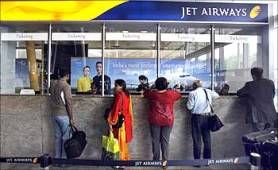 | « Back to article | Print this article |
 Jet Airways, the country’s largest air carrier, expects its debt burden to decline to Rs 8,250 crore (Rs 82.5 billion) by the end of this financial year, a fall of nearly 50 per cent from the corresponding figure at the end of 2011-12.
Jet Airways, the country’s largest air carrier, expects its debt burden to decline to Rs 8,250 crore (Rs 82.5 billion) by the end of this financial year, a fall of nearly 50 per cent from the corresponding figure at the end of 2011-12.
The process has got an impetus from the proposed equity infusion by Etihad Airways of Abu Dhabi.
“The infusion from Etihad will help Jet to repay most of its working capital loan.
“The company will then be left with only debt related to aircraft acquisition that it can service comfortably,” says Jasdeep Walia, aviation analyst at Kotak Institutional Equity.
He estimates Jet’s working capital loans to be around Rs 5,000 crore (Rs 50 billion) of its total debt of Rs 13,200 crore (Rs 132 billion) at the end of FY12.
Etihad is to invest around Rs 2,100 crore (Rs 21 billion) for a 24 per cent equity stake in the company. It is to also take 50.1 per cent in Jet Privilege, the customer loyalty programme, for around Rs 850 crore (Rs 8.5 billion).
In addition, Jet entered into a sale and lease-back agreement with Etihad for its three pairs of slots at London’s Heathrow airport for five years.
This deal is valued at around $70 million (Rs 385 crore).
If Jet is able to repay that loan at the end of the period, the slot ownership will revert to it.
Jet’s gross debt peaked at Rs 16,261 crore (Rs 162.61 billion) at the end of March 2009.
Since then, it has been steadily paring its loan burden through internal accrual, profits from sale and lease-back of aircraft and an almost complete freeze on capital expenditure.
In these four years, the company cut its debt by Rs 4,800 crore, including $400 million repaid in FY13.
“We had a debt reduction plan of roughly $400 mn in FY13.
The last part of that got accomplished due to sale and lease-back of some of our airplanes, as well as some cash we got through sale and lease-back of slots and other cash inflows,” said K G Vishwanath, the airline’s vice-president, commercial strategy and investor relations, during Jet analysts’